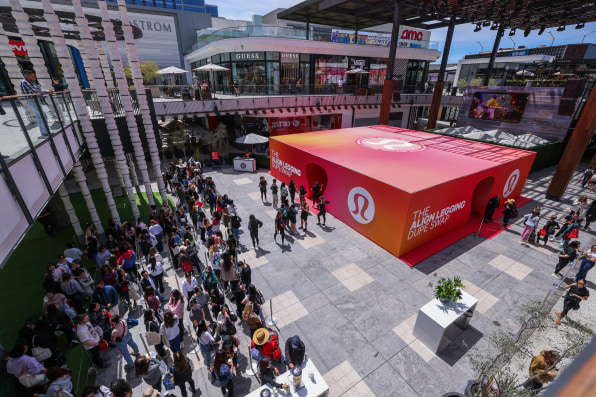Steal the multichannel retail playbook that helped scale Bushbalm into an international, 8-figure brand.
There’s nothing sexy about selling “pubic hair oil.” David Gaylord, co-founder and CEO of Bushbalm, learned this quickly after launching the bikini line skincare brand 7 years ago.
But fast-forward to today, Bushbalm is pulling in $9m in sales annually.
In this episode, David delves into the intricacies of launching, testing, at times failing, and scaling a successful bikini line skincare company. Tune in and hear:
- The (in David’s words) funny origin story of Bushbalm
- How Bushbalm solved major stockout issues for top-selling products following their appearance on Dragon’s Den
- How to balance the growth you want with the growth your brand can handle
- The wholesale strategy Bushbalm used to expand internationally
““The number one investment I tell people to not waste their time on (and everyone does) is fidgeting on your site… just talk to people and see what works and why. Spend time on other channels, other audiences, other angles, [but] don’t fidget because it’s probably not gonna do much.”David Gaylord, co-founder & CEO of Bushbalm
Meet David Gaylord
David Gaylord, co-founder and CEO of Bushbalm, a bikini line skincare brand, gained a decade of retail experience from working in his family’s hardwood flooring business from a young age. He even helped his father launch an ecommerce channel for this business during the lumber industry crash.
In 2015, David joined Shopify to learn more about ecommerce and digital marketing. There, he worked for nearly 8 years, working his way up to Operations Lead. And while working at Shopify, he met his colleague and future co-founder, Tim Burns.
During his honeymoon, Tim discovered that his beard oil could be used for more than just facial hair care. This led to the idea of creating a skincare brand for people’s more intimate regions. To most of their friends, this was nothing more than a hilarious honeymoon story, but David had the vision to turn a weird idea into a business with no competition. True enough, what started as an exciting, yet (as David jokes) odd side hustle has grown into an 8-figure skincare giant.
Connect with David on: LinkedIn | Twitter
About Bushbalm
Bushbalm is a skincare brand that focuses on the bikini line. Their clean, plant-derived product lines combat common (and often taboo) problems, including razor burn, ingrown hairs, dark spots, and itchy pubic hair.
Approved by medical experts and loved by estheticians, Bushbalm products care for women’s most intimate areas so that they can feel confident in their skin.
Learn more about Bushbalm on: LinkedIn | Website
The Checkout episode 60 unpacks:
In this episode, Gavin shares the strategies and lessons he learned from bootstrapping and scaling Bushbalm. Here are the highlights:
The family business that inspired David’s trailblazing spirit
- David was inspired by his father’s trailblazing creativity
- After the lumber industry crashed in 2003, his father launched an innovative online flooring business with David’s help
- David gained invaluable retail experience working for his father’s business, Gaylord hardwood flooring, for the first decade of his career
- “When no one was selling hardwood flooring online, [my father] was like, I’d like to take our current brick and mortar store, do it online, and expand our footprint.”
The honeymoon story behind Bushbalm’s origins
- David began his career at Shopify in 2015 as an entry-level customer service executive, and he spent the next 8 years working his way up to Operation Lead
- While working for Shopify, David’s friend (and future co-founder), Tim Burns, came back from his honeymoon with a haphazard discovery that would lead to Bushbalm
- “Tim said, I’ve already got the business name it’s called Bushbalm, and it’s gonna be a product to make your downstairs smell nice. That was the pitch. And everyone else just laughed and thought it was the silliest thing ever. And I was like, yeah, I actually like it.”
Validating the idea with only $900
- The founders spent $900 to validate the idea with 100 bottles filled with a prototype formula
- David was primarily concerned with whether people would like the product rather than achieving massive sales
- “[Bushbalm] wasn’t about having it smell really nice down there… It was all about the skincare, which took us a few years to find out.”
Finding the right positioning for the product
- Bushbalm was slow to take off as the team struggled to find its product-market fit
- At an Etsy trade show, the team even changed the booth’s messaging daily to see what resonated with people. For instance, they tested “bush balm bush oil” (no one wanted that), “pubic oil” (another fail), and finally found success with “bikini line skincare”
- “We changed the tone of the brand, and it was all about skincare versus bush oil or pubic oil. [Suddenly, the products were] a lot sexier.”
- Almost 4 years in and Bushbalm found its product-market fit, growing into a 7-figure business almost overnight
Why Bushbalm declined the $400,000 equity deal
- After pitching on CBS’ The Dragons’ Den in December 2020, Arlene Dickinson offered Bushbalm a $400,000 deal in exchange for a 10% stake; they initially accepted this offer on the show but ultimately turned down this deal later
- At the time, Bushbalm was doing ~$1.8m in sales (and growing) and had just hired its first full-time team member
- “That’s when we put the gas down, and we went back to [Arlene’s team] on January 11th. And we were like, things have pretty materially changed, so maybe it’s not the right time. And they were like, yeah, totally fine.”
How Bushbalm solved their biggest stockout challenge
- Bushbalm grew from $1.8m to $8.3m in sales in just one year
- This sudden growth made demand forecasting a massive challenge and left the company stocked out on many of its products for about 6 months
- David learned that stocking up on your lowest-cost components and warehousing them helped reduce supply chain lead times without heavily impacting cash flow
- A friend (who happened to be a CFO), asked David what item in their supply chain was the least expensive and which had the longest lead time; it was their bottles and boxes
- “[My CFO friend] was like, your problem is easy to solve. Just buy millions of boxes and bottles, store them in North America, [so it only] takes you 30 days to fill them.”
DTC-inspired wholesale
- In 2021, Bushbalm started selling post-waxing skincare products wholesale to salons
- Today, Bushbalm has over 2,000 wholesale accounts
- Investors warned the Bushbalm team that this channel introduces new complexities to a business. And while true, Bushbalm has adopted a DTC-inspired wholesale model that makes these operations radically easier
- “We’ve built [our wholesale channels] like a DTC business.” Meaning, Bushbalm built a separate Shopify store for its wholesale channel where partners (in this case, waxing salons) can place their orders
Testing wholesale with smaller retailers
- Bushbalm first worked with hand-picked retail stores in Canada to test, learn, iterate, and confirm that their products could succeed in a traditional retail channel
- Prioritizing smaller retailers allowed Bushbalm to test the viability of a wholesale model with minimal risk
Diversifying sales channels to improve cashflow
- Bushbalm achieved a balance between sales channels with varying cash conversion cycles, despite working with major retailers which usually have longer cycles
- “I always say DTC is the best way to find your channel and find your [market] fit.”
The secrets to growing a multimillion-dollar brand
- David’s recommendation is for brands to prioritize diversifying their channels and audiences rather than spending valuable time on superficial and less valuable tasks
- If you want to grow your customer base, ask: Can I guarantee that I’ll see a return on my investment if I unlock growth with paid ads, or should I grow my audience organically?
- “The questions people need to start asking are: Do you need to grow? How fast do you need to grow? And how fast do you actually want to grow?”
![Your Guide To Improving Multi-Location Inventory Management [7 Strategies]](https://cogsy.com/wp-content/uploads/2023/06/Multi-location-inventory-management-scaled.jpg)

